This is part of my ongoing series in which I compare four translations of Final Fantasy VI with the original Japanese script. For project details and my translation notes from Day 1, see here.
Comparison Summary
We’ve looked at four different translations of Final Fantasy VI in great detail and compared each one with the original Japanese script. Each version has its own pros and cons in terms of gameplay, presentation, content differences, and so on. But in terms of translation only:
I feel that the Game Boy Advance translation of Final Fantasy VI is unquestionably the best translation out of all of them, by far.
For all the full details behind this conclusion, check out all my previousFinal Fantasy VI comparison notes and the live comparison videos here.
Translation Impressions
If you haven’t followed along on this big comparison journey, here’s an overview of each translation we looked at.
Super NES
This was the first English translation of Final Fantasy VI. It was released in 1994, when serious game localization was still in its early stages. I loved the game as a youngster, and I’m sure its translation helped push me toward becoming a professional translator years later. So it’s got an important place in my heart.
Going into this project, I knew the Super NES translation had some flaws and mistranslations, but I was fond of the game, fully enjoyed it without issue at the time, and had many good memories of it. So I always assumed these translation issues were minor in the grand scope of things. I was wrong.
It turns out the Super NES translation has many deeper problems than I think most fans realize. It has major mistranslations and issues right from the start and doesn’t let up until the game is over. Here are a few quick examples:
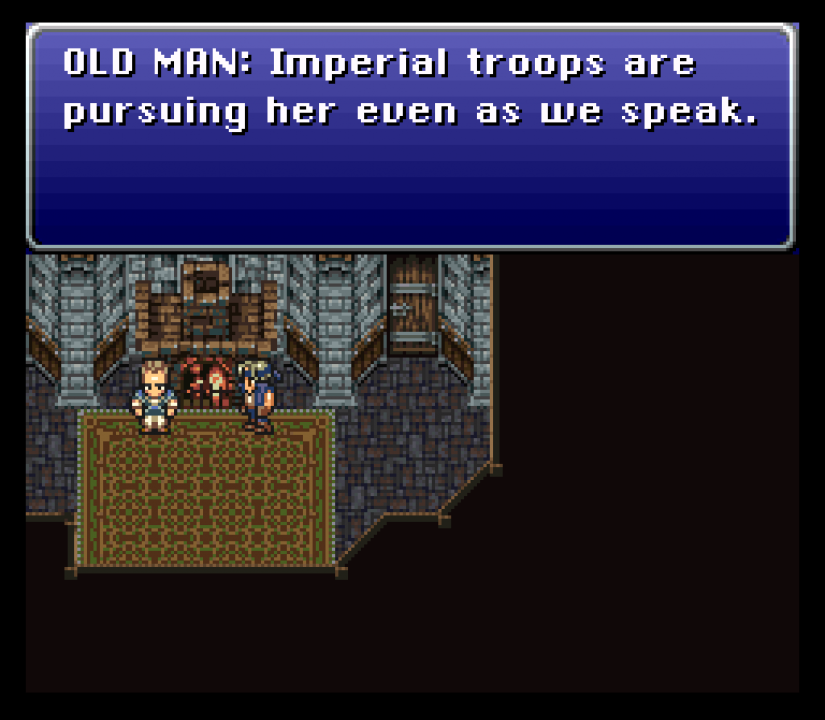
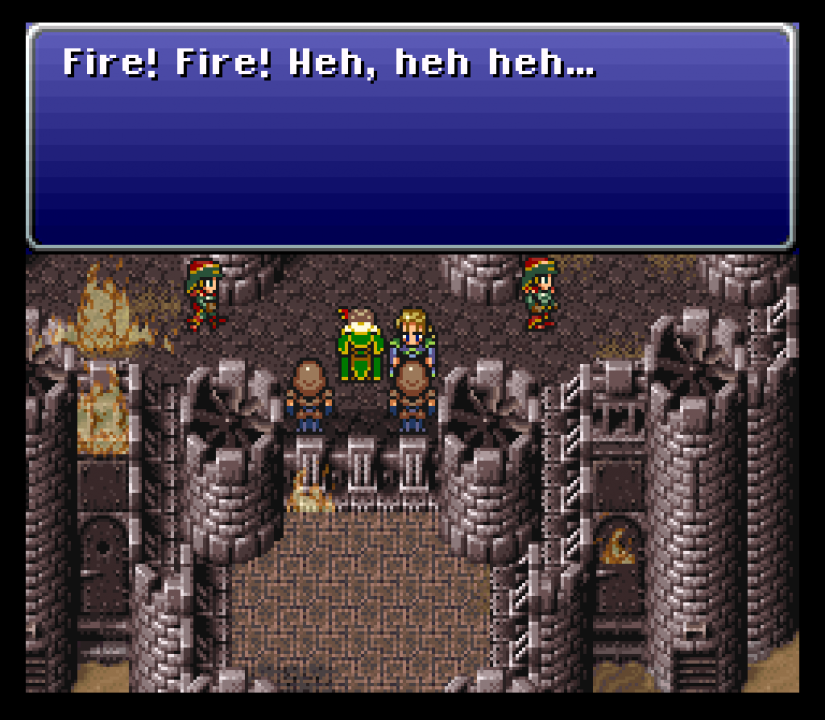
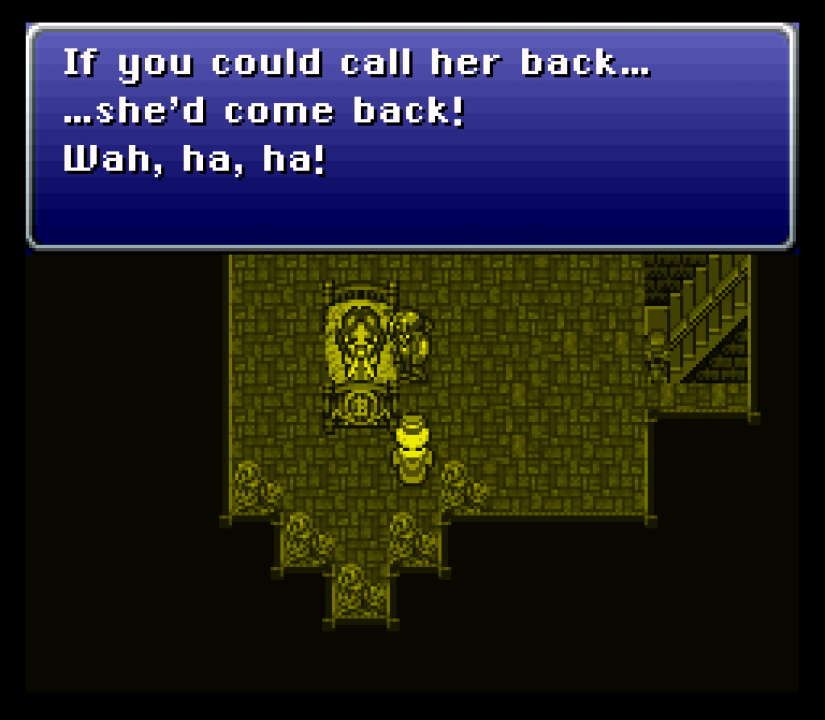
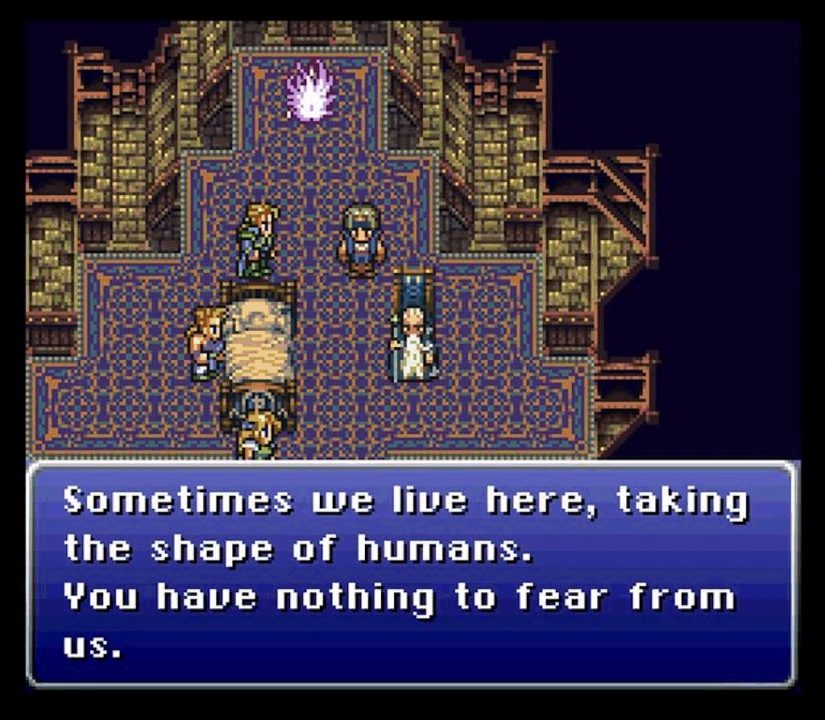
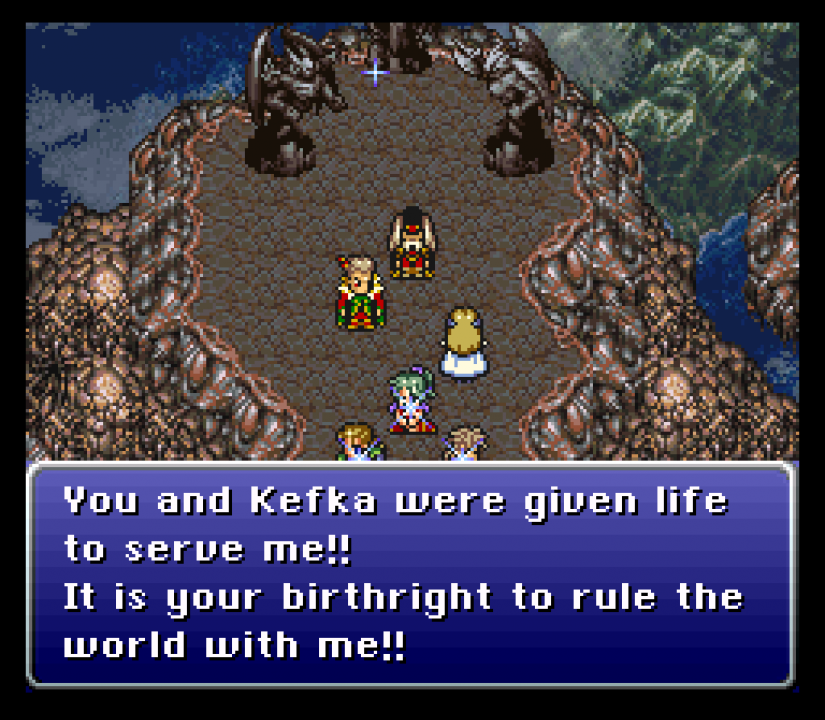
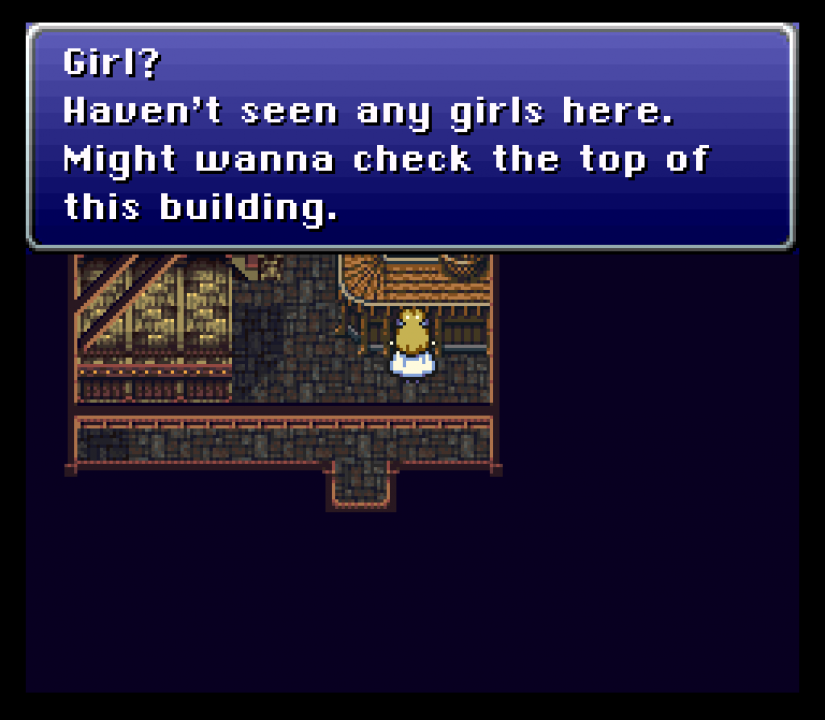
These kinds of problems are unrelenting from start to end. And this isn’t even counting the more obvious things like typos, censored content, out-of-place phrases, and so on.
Until I did this project, I always assumed the issues with the Super NES translation were limited to a handful of names, the ”frightful dragon” line, Setzer’s quote about business, and stuff like that. So I was surprised to see how many deeper issues there really are.
Again, I loved the Super NES version of the game when it was released, and I didn’t even notice these issues at the time. Looking back, I think it’s because the game itself shines so brightly that it makes the translation flaws seem less obvious and less significant.
Note that none of this is meant to disparage Ted Woolsey, the Super NES translator. In fact, I’ve always considered him a pioneer in the game translation field, a legend, and a personal inspiration. Not only did he help bring game localization quality to a new level, he also worked under tremendously tough conditions and deadlines. Even the best translators out there would (and do) make mistakes when rushed or given inadequate resources. So despite its countless flaws, the Super NES translation still manages to be impressive.
Game Boy Advance
Final Fantasy VI got a fresh re-translation when it was released on the Game Boy Advance in 2007. Game localization had improved greatly by this point, but I recall there were a lot of “Why does it even need to be retranslated? The original translation was just fine” comments back then. I felt the same way myself, plus I didn’t like the new tiny font on the already tiny GBA screen, the weird new colors, or the weird new audio. Between these issues and my love for the original translation, I never gave this new version of Final Fantasy VI a serious chance. I think I played it for an hour in 2007 and then never again.
It felt like many fans were still attached to the original translation, and I’d heard on various sites that while the GBA translation did fix old translation issues, it was also a lot wordier, had less spirit, and that it added in memes. I saw this repeated enough that I never paid much attention to the new translation until now. So I was pleasantly surprised to see how much better the GBA translation actually is!
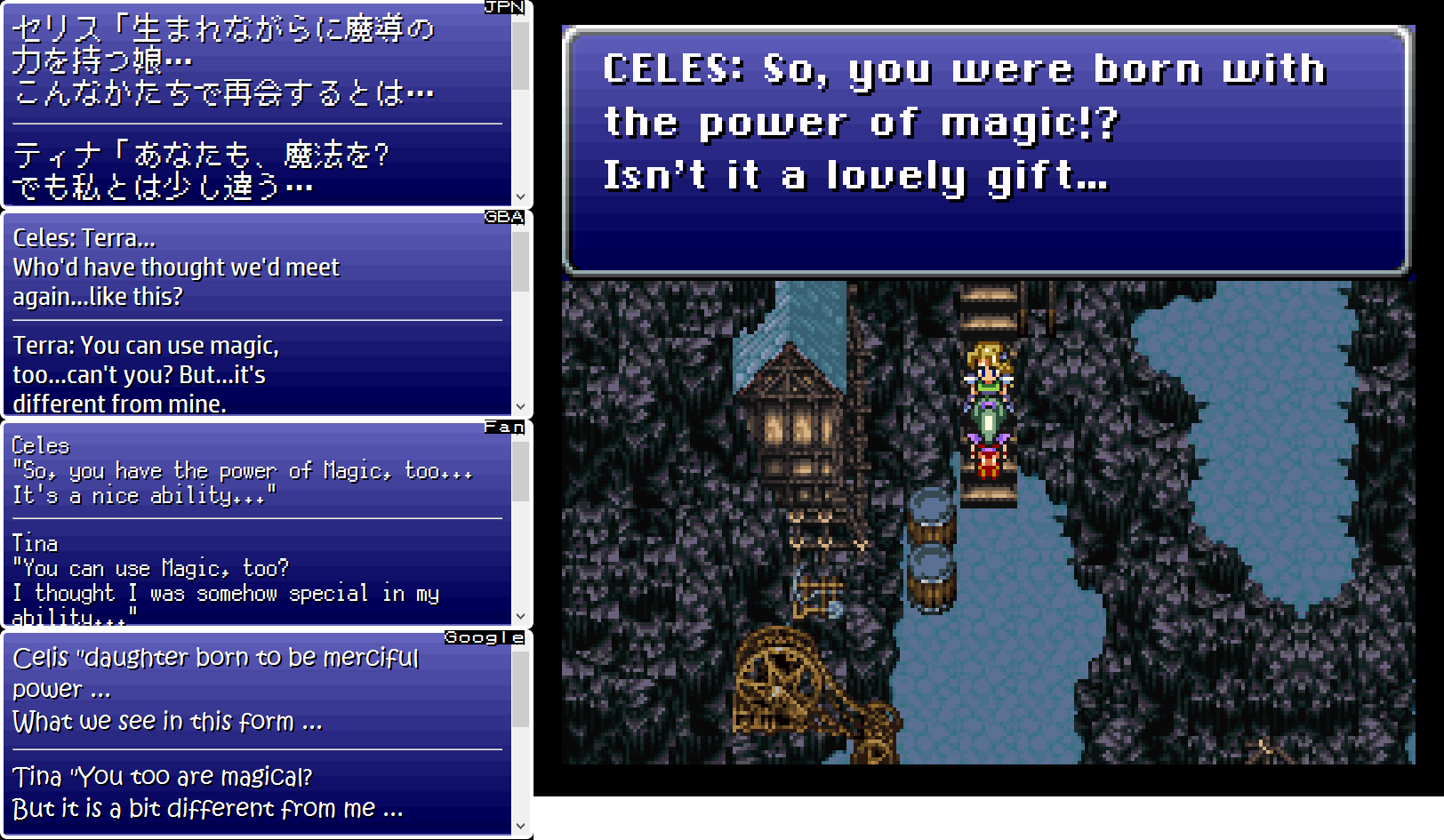
The GBA translation isn’t flawless, though. It has a couple minor translation mistakes, and it’s true that it adds references and memes into the script. They’re handled with more tact than the references inserted into the Super NES translation, however. In fact, I’d wager most of the GBA translation’s references go unnoticed unless they’re pointed out and explained.
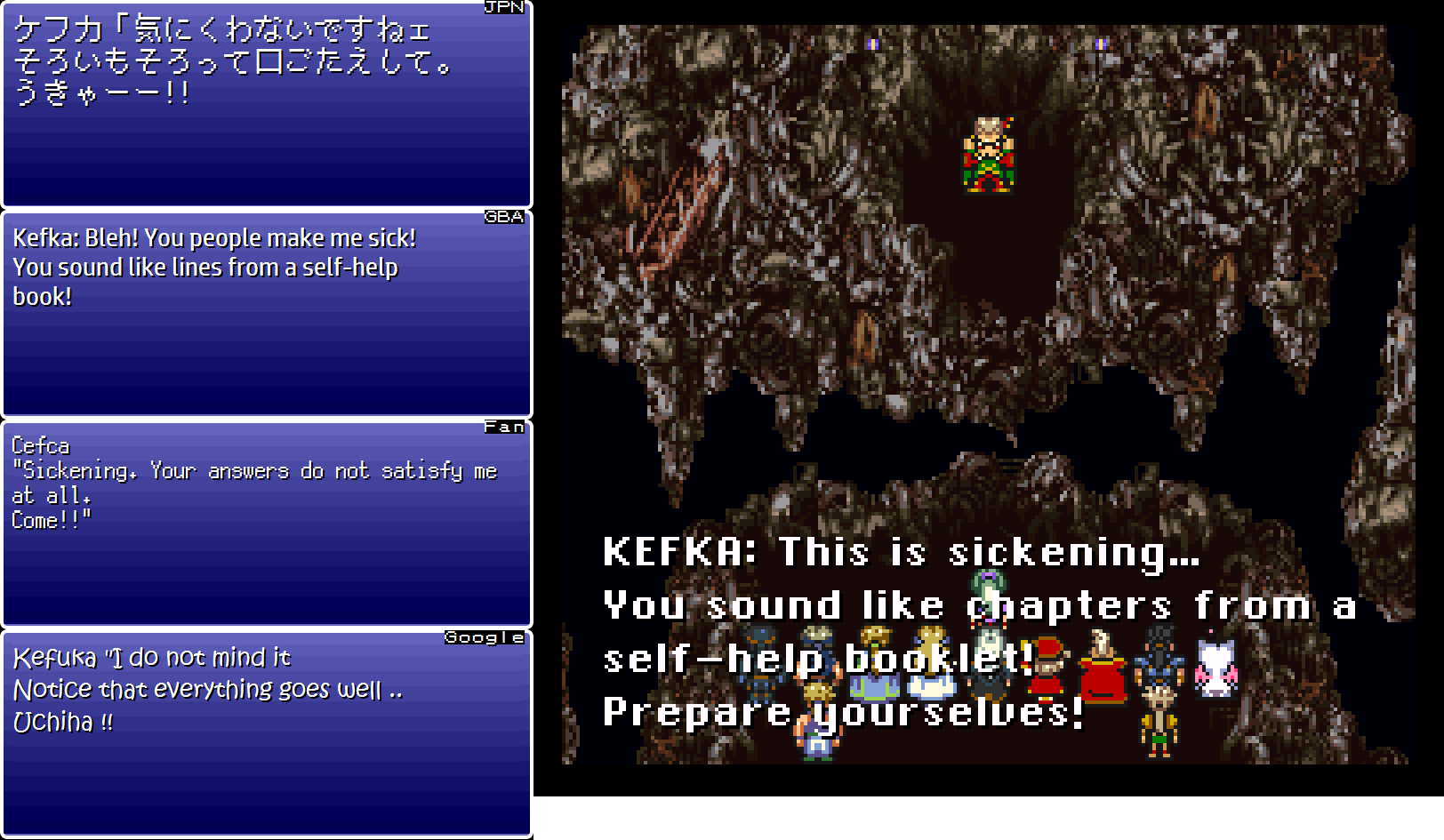
I can see both sides to this homage approach: the purpose of the translation is to be fun, and including these throwbacks helps keep things fun, particularly for old fans who might get a smile out of seeing an old famous line. At the same time, I can also see the mindset of “if you’re going to do a full re-translation, then you should stay true to that and not look back”. I think it boils down to how different people view the game.
Fan Translation
As part of this big comparison project, I also looked at the prominent RPGOne fan translation of Final Fantasy VI, often known as the “SkyRender” translation. It was first released in 2004, but we looked at the latest updated version from 2005.
I hadn’t played this fan translation before, and I only knew little snippets about it from random forum posts I’d seen over the previous 13 years. I basically saw it described every time as being too dry, stiff, or literal. The few complaints I saw usually referred to the Experience Egg password and one or two other very small, specific things.
It’s true that the writing in the fan translation is kind of stilted, but I was surprised to see how many severe translation problems it contains. It’s clear that this was a labor of love and that the project members were driven by their passion for the game. But the task was just too much for the translator’s skill at the time. The best comparison I can make is if an eager student who just started studying algebra tried to take a college calculus test. Their intentions are good, even laudable, but they still need many more years of experience.
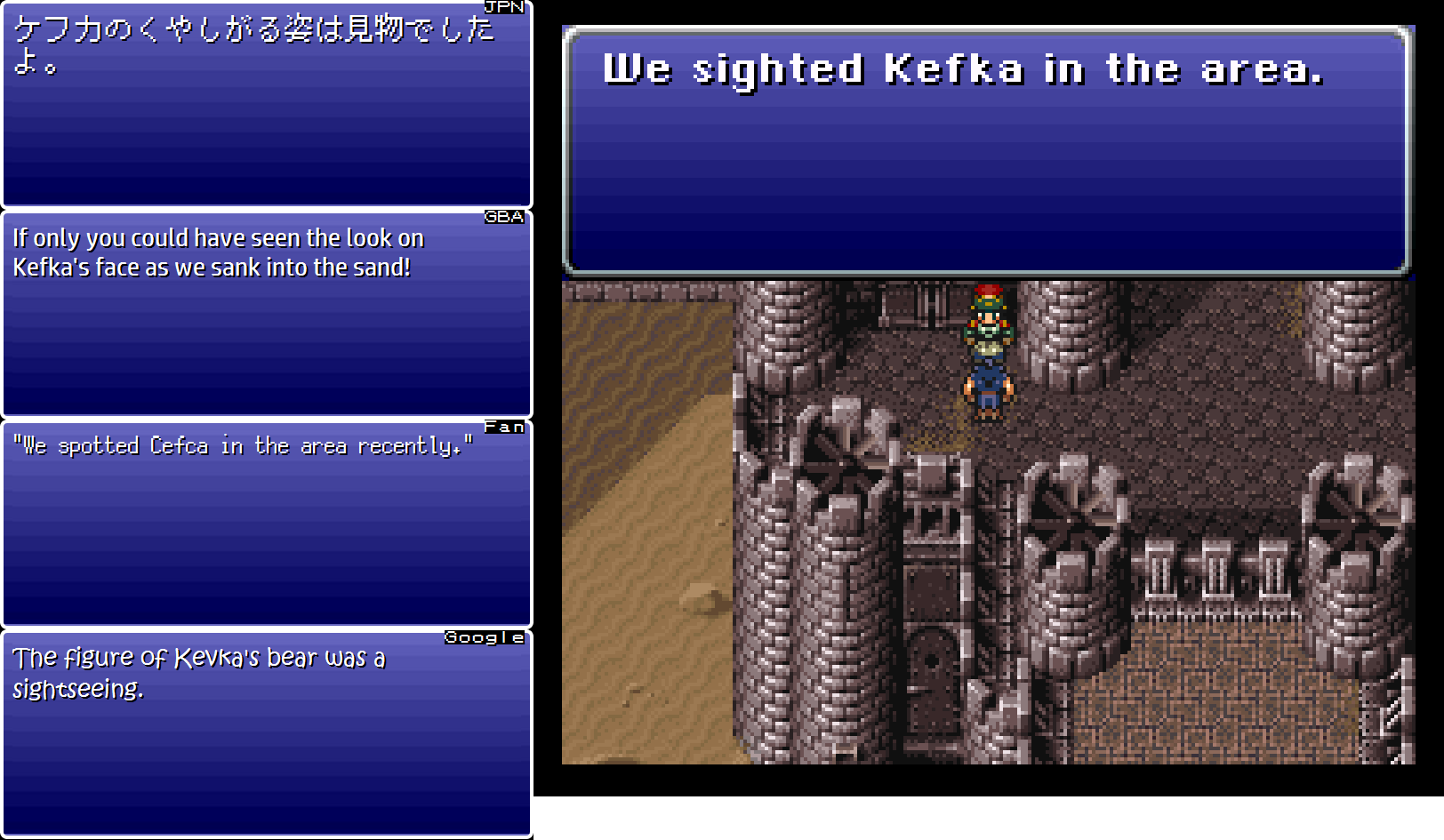
I should also mention that in terms of reprogramming and such, this fan translation is impressive. It even includes optional fixes for bugs and glitches found in the original game. Still, if this were a translation class, the fan translation would get a failing grade. And it might also lead to expulsion for plagiarism.
As I mentioned before, we actually looked at the latest version of the fan translation for this project. But afterward, I started to wonder what the initial release was like. I only took a quick peek, but here are some screenshots:
I bring this up not to crap all over the fan translation, but because I wished we had examined this initial release instead. I didn’t realize it at the start, but spotting translation mistakes and then explaining why they’re mistakes was arguably more interesting and educational than simply looking at the official translations.
So while the latest fan translation offered a lot insight into the Japanese language and all the translation hurdles that come with it, I think the initial release would’ve provided much more to look at.
Google Translation
We also looked at a machine translated version of Final Fantasy VI. For reference, I ran most of the game’s text through Google Translate in June 2017.
After my hilarious Google Translated version of Final Fantasy IV from a few years before, I don’t think anyone had high hopes for this Final Fantasy VI Google translation. I included it on a lark at first, mostly because it was easy to add. But just like with the fan translation, it turned out to be much more educational than I ever expected. It even regularly helped me make my point when I would explain how the other translations worked.
Google’s crazy translation choices were indeed funny, but being able to point out why those crazy choices happened was a highlight of the project for me. Of course, sometimes the choices were so bizarre that I had no explanation for them. But then there were moments when the Google translation were genuinely good. And there were even rare times when the Google translation handled things better than all the other versions.
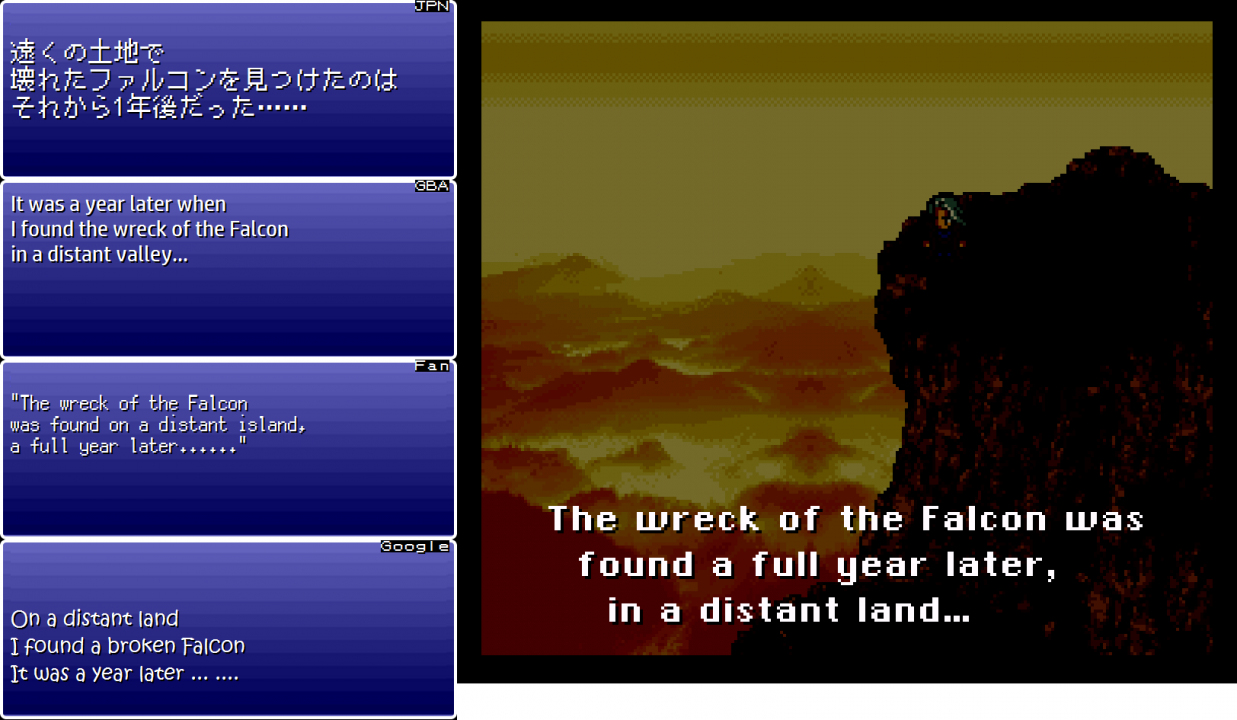
All in all, the Google translation was entertaining and enlightening. But the overall translation was so poor that I would never recommend anyone play a game using a machine translation of this quality. If this were a translation class, rather than give the translation a grade, I’d probably have a meeting with the student and suggest a different career path.
Other Translations
We looked at four different translations of Final Fantasy VI during this project, but there are actually more than that. Here are some others that might be fun to look at someday.
PlayStation Translation
Final Fantasy VI received a PlayStation port in 1999. The English translation appears to be nearly identical to the Super NES translation, but I do know of two small changes at least:
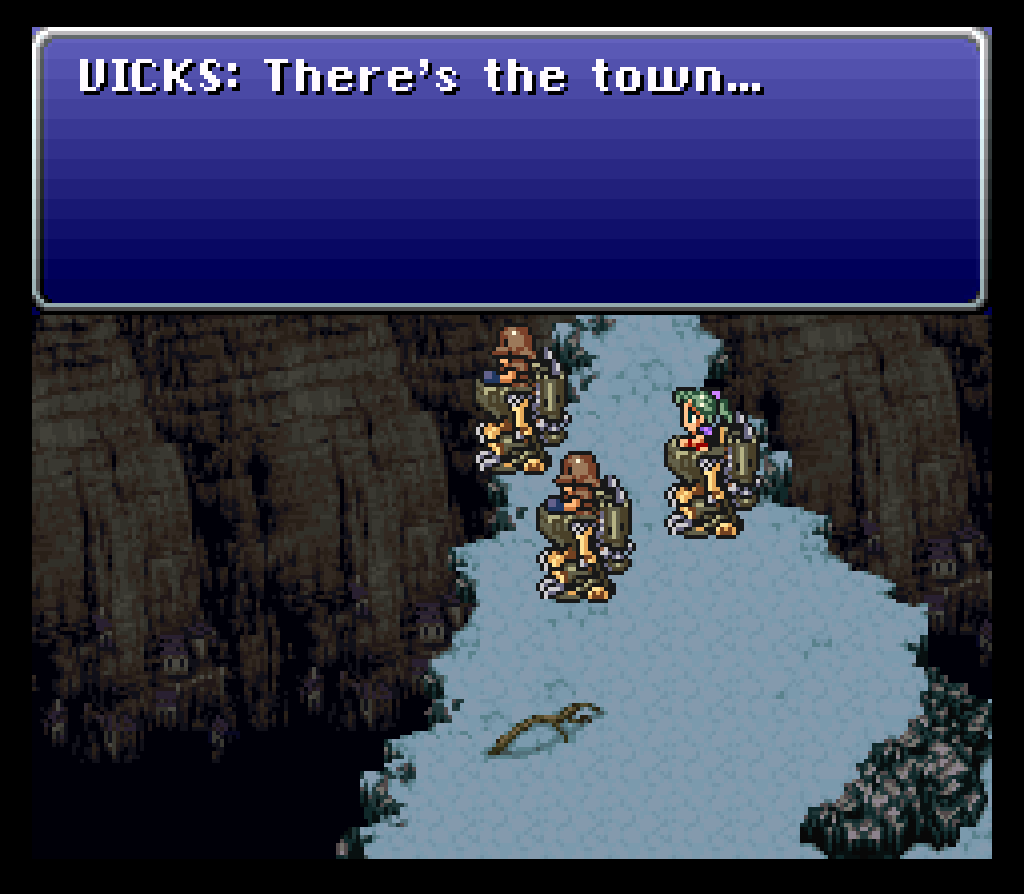 | 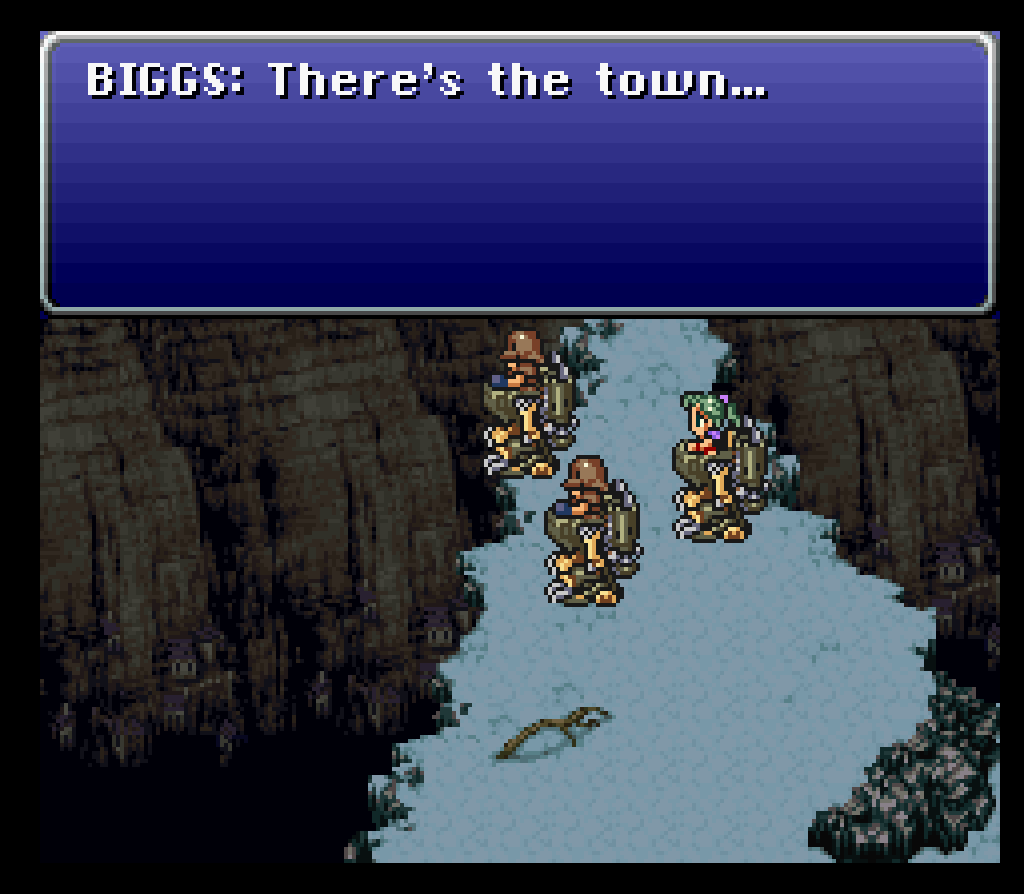 |
| "Vicks" in the Super NES translation | Changed to "Biggs" in the PlayStation translation |
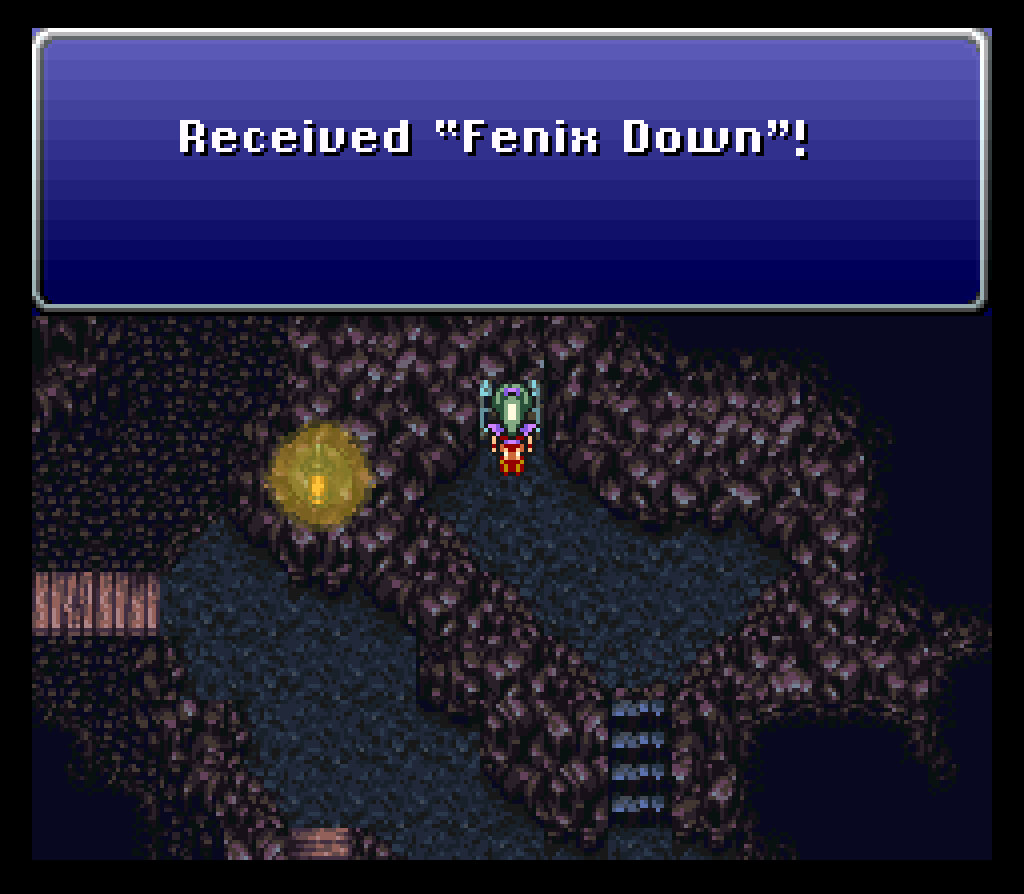 | 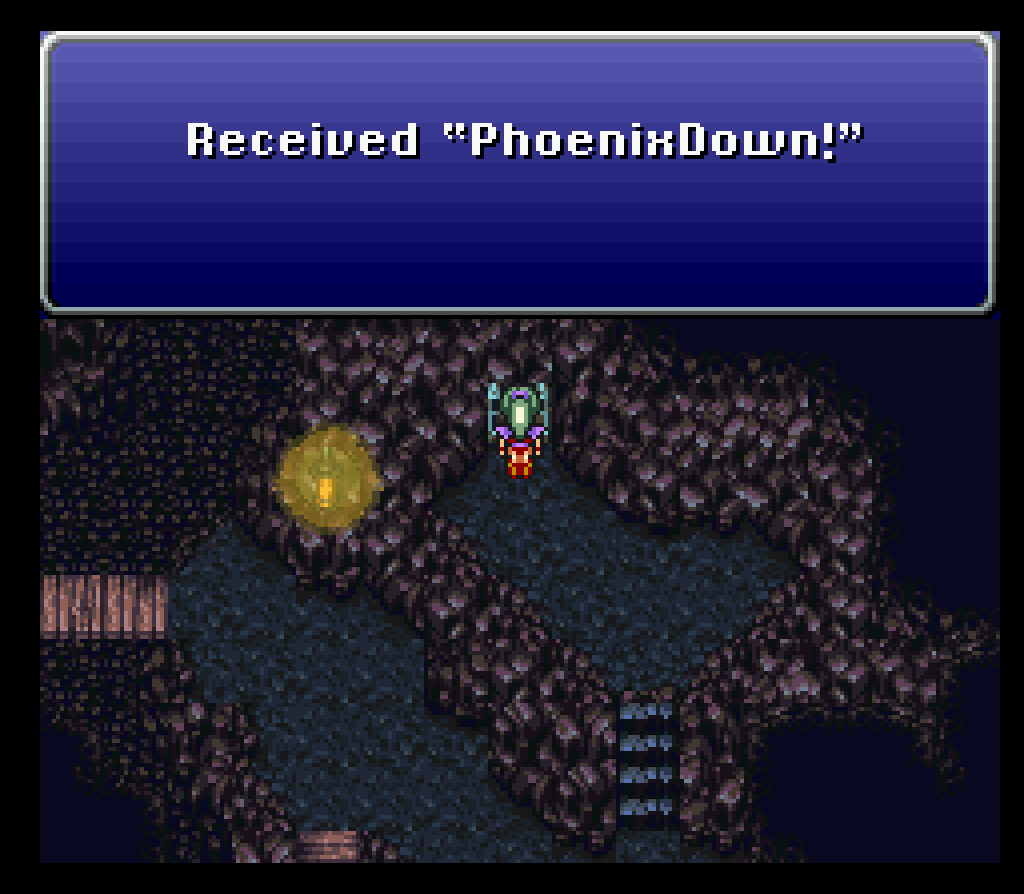 |
| "Fenix Down" in the Super NES translation | Changed to "PhoenixDown" and "Phoenix Down" in the PlayStation translation |
This makes me wonder what else might’ve been updated for the PlayStation translation. Unfortunately, I don’t think anyone’s done a detailed comparison. I was planning to do one myself, but I’m not familiar enough with PlayStation programming to extract the game’s text at the moment. It’d be a fun topic for a future article, though.
PC / Mobile Translation
A mobile port of Final Fantasy VI was released in 2014, and a PC version of the mobile port was released in 2015. I haven’t been eager to play either of these versions, but I’ve heard that they use the Game Boy Advance translation’s text, which is a good sign.
Even so, the mobile port left a poor first impression when it couldn’t even get the word “esper” right during the game’s introduction:
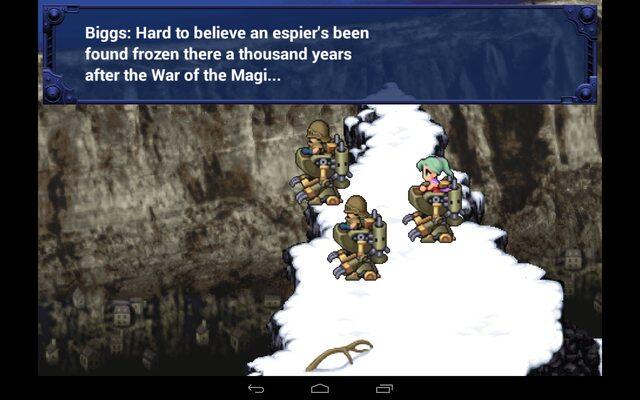
This obvious mistake also left fans wondering how it could’ve even happened in the first place. My theory is that someone had to manually re-type every line from the GBA translation into this new version, but that’s just a guess based on what happened with Final Fantasy IV and its modern ports. In fact, just like with Final Fantasy IV, it’s very possible that the GBA, mobile, and PC translations all have slight differences that have yet to be documented.
Other Fan Translations
We looked at the most prominent fan translation of Final Fantasy VI during this project, but there are more out there. I haven’t paid much attention to the fan re-translation scene, but here are some others that I’ve been told about:
- Final Fantasy VI – Ted Woolsey Uncensored Edition – this appears to be a mix-and-match of all the existing translations rather than an actual re-translation. It also changes/adds other stuff not related to the translation itself.
- Final Fantasy VI Relocalization Project – “This hack features a completely new script based heavily on the GBA translation, completely uncensored graphics, a fancy new font, dozens of bugfixes, full descriptions for all items and spells, and a variety of other small fixes and tweaks to make this the best possible version of Final Fantasy VI without altering the actual gameplay in an appreciable way.”
- KWhazit’s big translation analysis/re-translation
- Lina Darkstar’s re-translation (PDF) (DOC)
I’m sure these aren’t the only fan re-translation projects out there, so let me know if I’ve missed any.
Final Thoughts
I originally intended for this project to be a simple, quick, stream-focused comparison of Final Fantasy VI translations. But even though it wound up turning into a monster of a task, it’s taught me so many things, pushed me to develop and release helpful tools, and helped me discover a new focus for this site.
As we’ve seen, there’s still a lot more we could look at, analyze, and compare. There’s still about 350 lines of text we could still look at too:
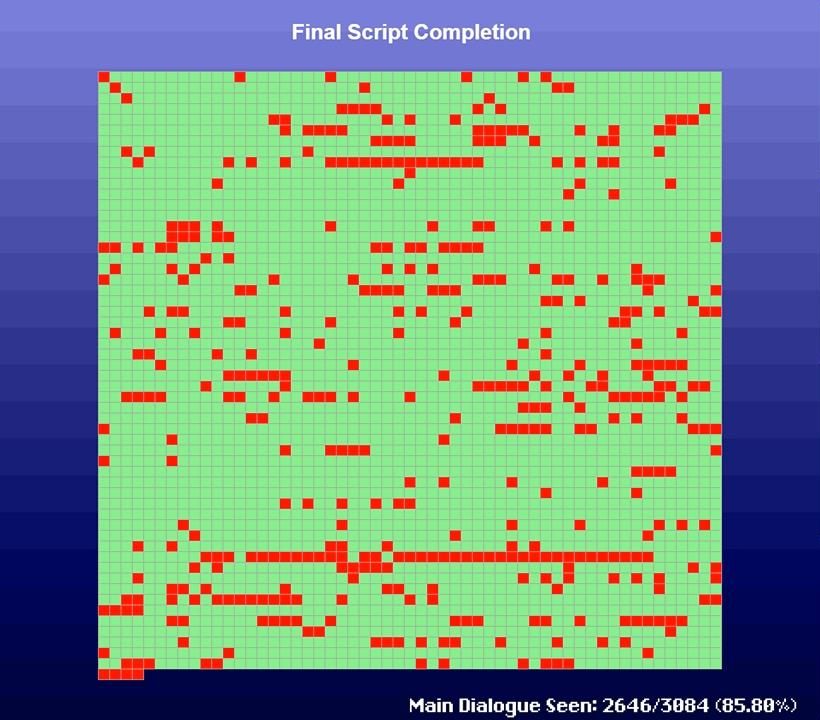
But for now, I think it’d be nice to bring this project to a close. Who knows, maybe we’ll take a look at all this other stuff in future articles or a book or something. Although I imagine a book would focus less on side-by-side comparisons and be more like my EarthBound book. At the very least, I don’t think I’d cover the fan translations or machine translations in a book.
Anyway, all that aside, I had a lot of fun with this Final Fantasy VI comparison project, and I learned so many new things. I hope you enjoyed it too. I’d actually like to make this kind of live, interactive, multi-comparison project a main focus for my site, so hopefully this is just the start of things to come!



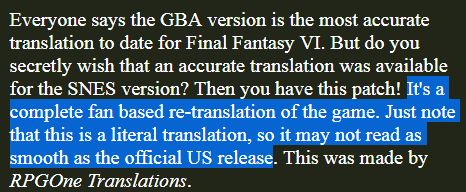




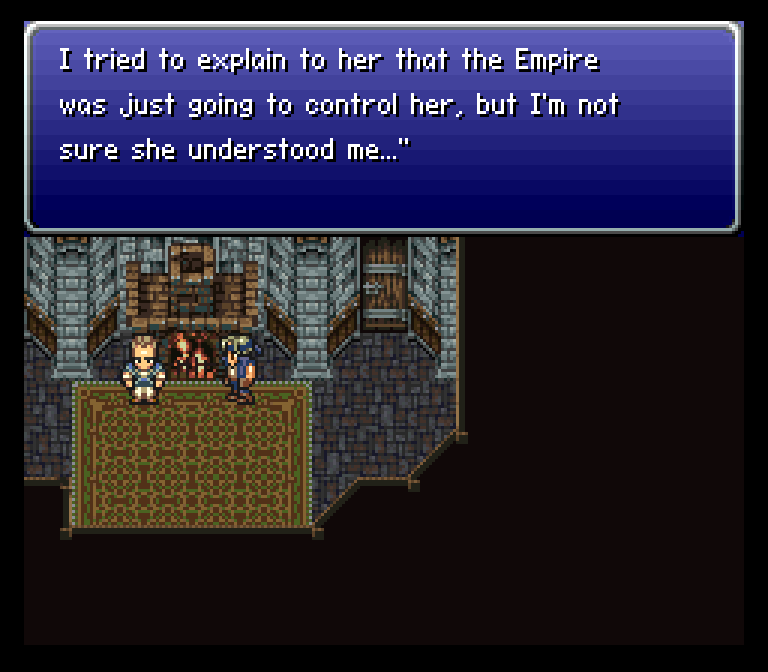
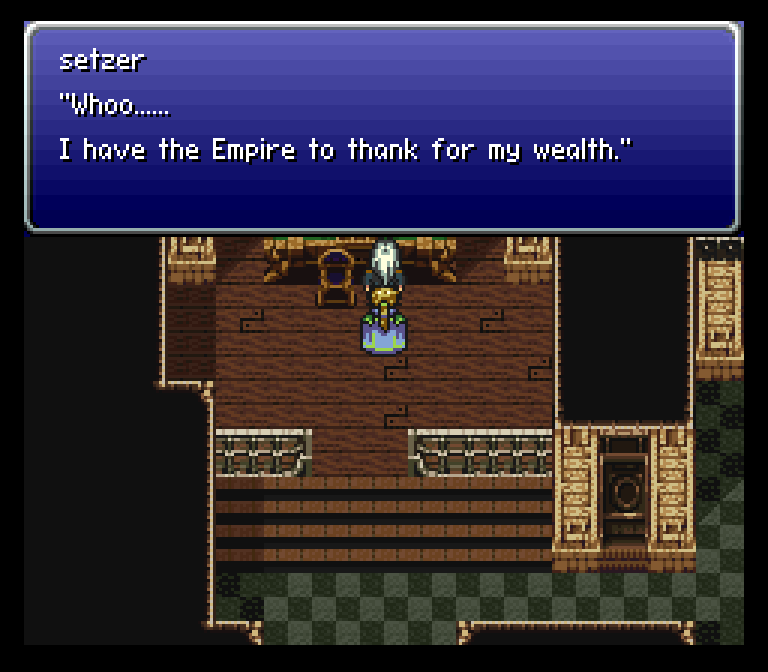
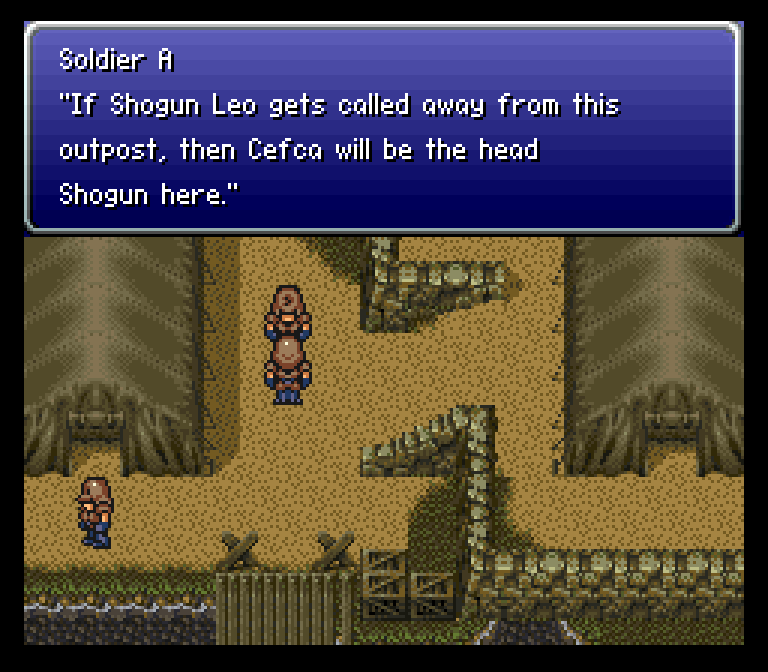
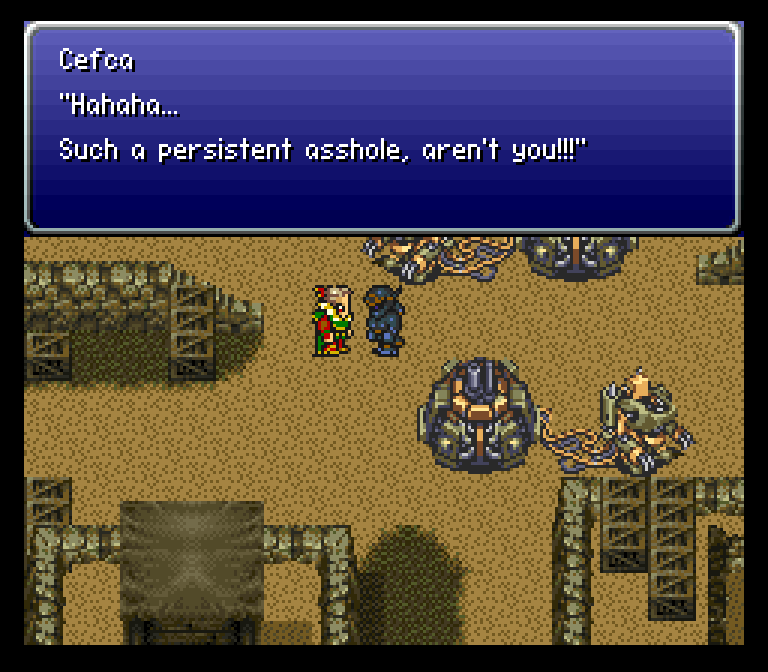
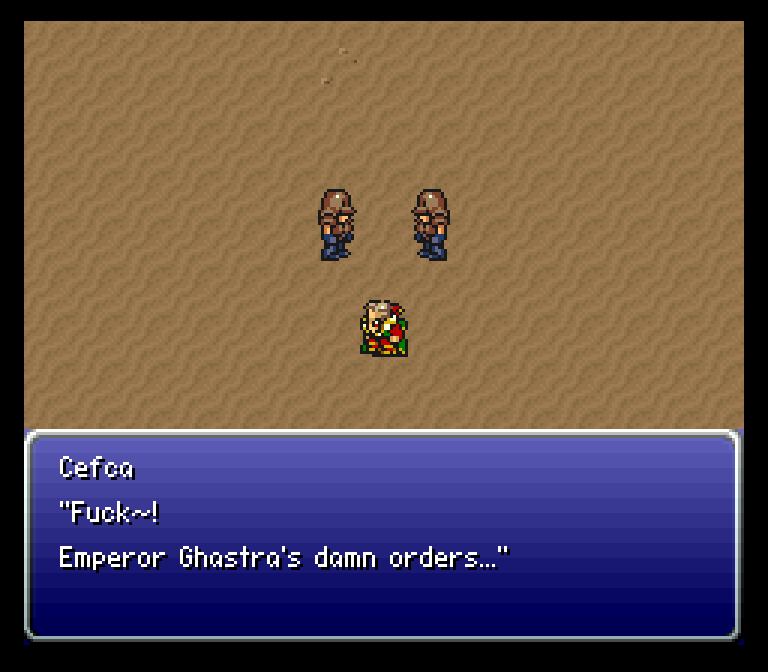
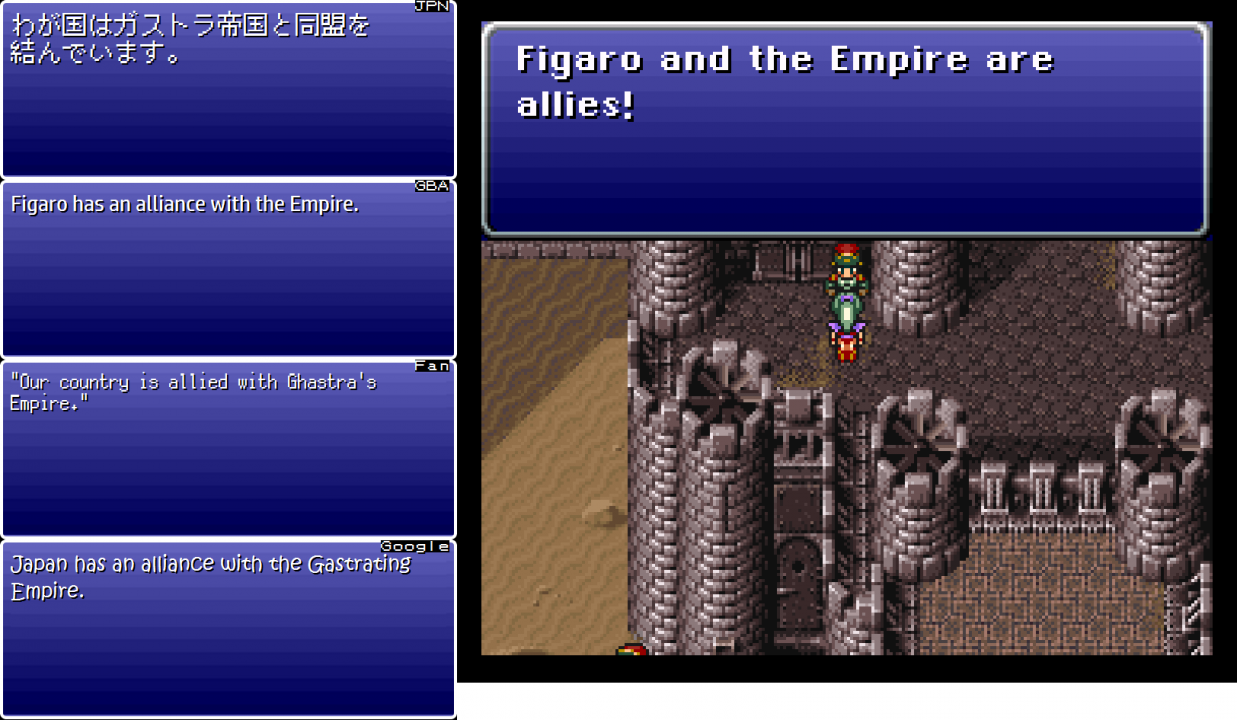
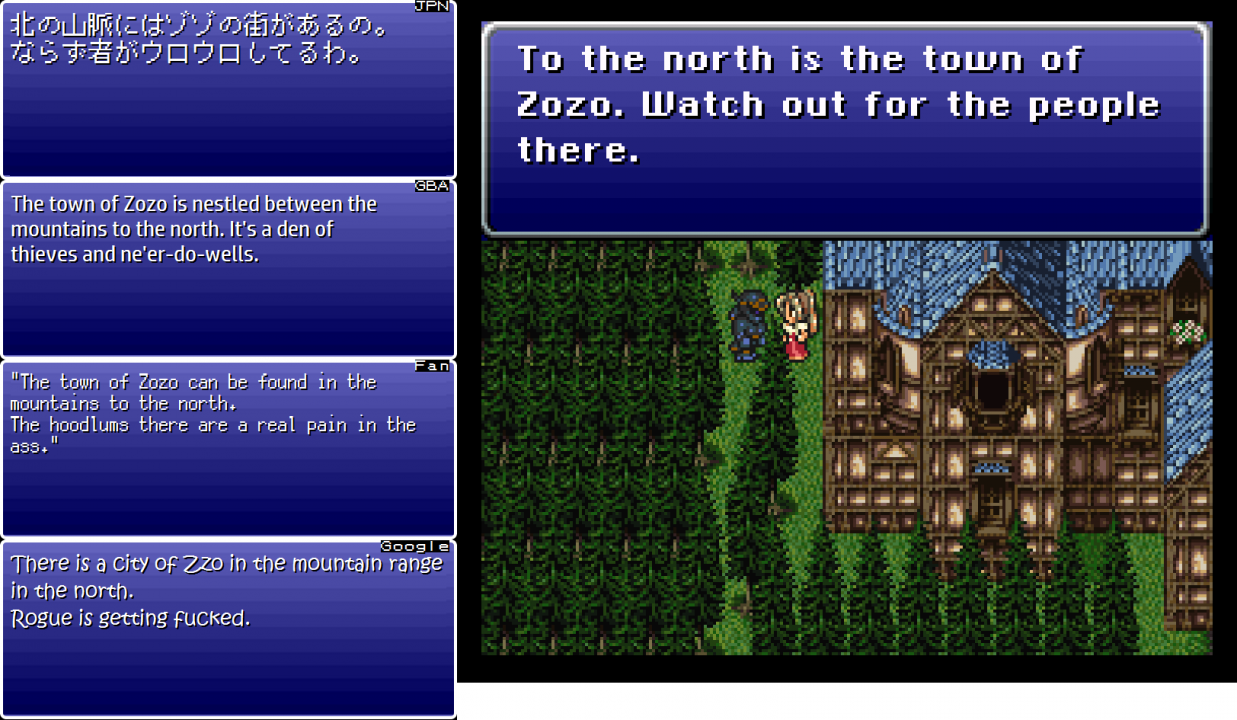
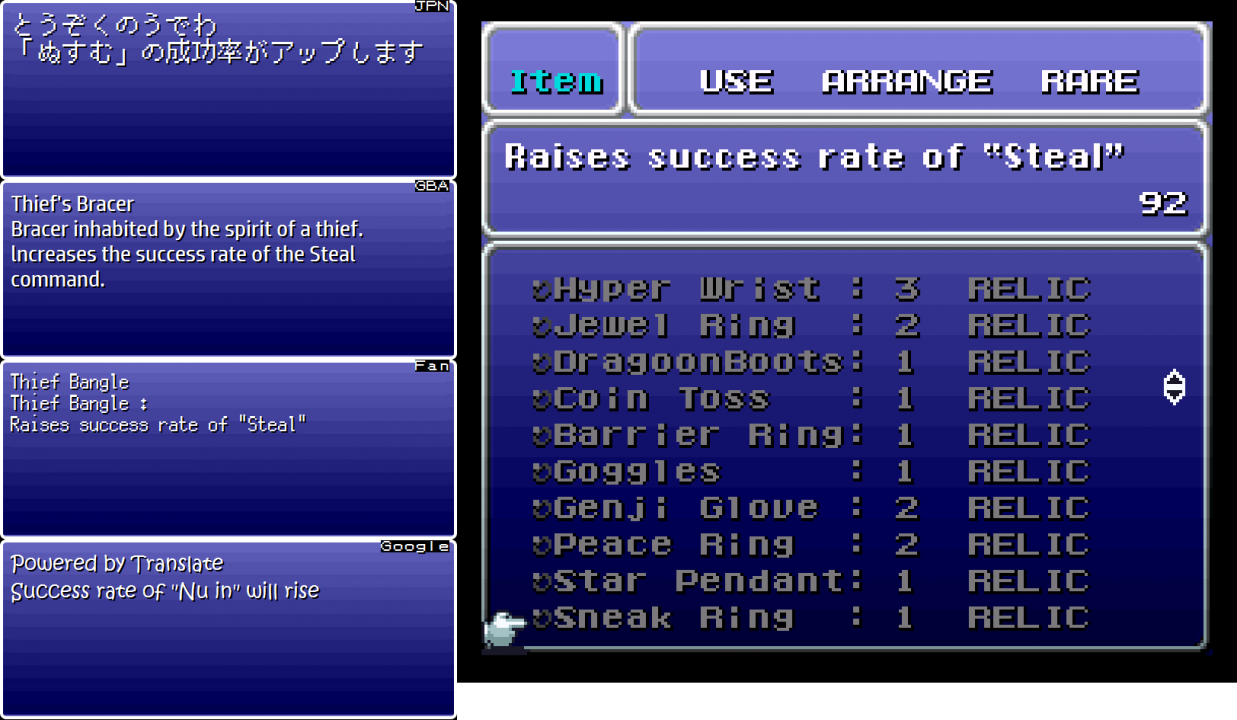
![press start to translate [Final Fantasy IV] press start to translate [Final Fantasy IV]](https://legendsoflocalization.com/wp-content/uploads/2018/05/pressstart.jpg)
This is so impressive. Thank you so much for doing this.
“There’s still about 350 lines of text would could still look at too:”
I think there may be a little typo in that line of text…
But that’s okay, it happens to all of us. ^_^
This was excellent, thank you!
FFVI I do find to be one of personally preferred ones (the memory of seeing the orange glow of the title letters appear to the ominous music as a long car ride began- it shall endure), even if I only completed the entire game perhaps twice. A little thin in the gameplay department, but I do enjoy its plot and certainly the soundtrack.
If there is any glaring moment I see with the GBA translation, it’s Kefka’s reaction to getting stabbed. Where they broke into stuttering madness in the Japanese, they turned fully eloquent in the GBA. I mean the point is still made that Kefka is furious at Celes, but the stuttering shows Kefka as FURIOUS, and fundamentally changed for the worse.
Good point! I recall that scene during the stream and it definitely seemed like a step down for Kefka to get all fancy wordy there.
Amazing work! I hope this gets good traction in the circles that would appreciate it.
I really appreciated this project. It’s both very fun and very informative. I feel wiser!
Thank you for this amazing analysis, Mato. FF6 is my favorite Final Fantasy game, and I learned all sorts of little connections that I never noticed over the years. This game truly stands the test of time.
It’s disappointing to know how lacking the SNES translation is, though. I always chalked it up to time constraints and limited resources, but even in that context it seems lacking. It looks like the haters were on to something. :/ On the flip side, it made me appreciate the GBA version a lot more, which was always my preferred version (especially with a patch to restore the original sound).
This is a long shot, but have you ever considered reaching out to Woolsey or Slattery for their thoughts on their FF6 translations? I know there’s the Slattery interview I linked here, but it would be interesting to hear the translators’ thoughts if they aren’t bound by any NDAs. Plus, I know Sky Render comments on here, so it would be pretty cool to hear multiple translators’ perspectives.
I heard a podcast interview with woosley years ago in 07-08, back when podcasts were barely a thing called payer one podcast. He was very cognizant and humble about how flawed the translation was. I actually remember sympathizing with him greatly because of the work load he was given and how hard he must have worked. Games were so different back then, ff6 was a triple A game of the time, but still, allocating resources to translation were an afterthought.
Time constraints and limited resources were definitely a huge part of it. Mistranslations happen when you have to rush and don’t get the luxury of spending some time to review your own translations afterwards, and Woolsey has said he had to translate a bunch of stuff out of context because it was optional dialogue he hadn’t encountered in his one playthrough of the game and thus had no idea how fit into the game.
Slattery is reachable by email. I sent him some fan mail a few months ago for his work on FFIV and he replied. I expect he already knows about this translation comparison. I have a lot of respect for him and the work he did in fixing the SNES-era Final Fantasies.
Mato, did you already drop him a line? He might like hearing from you.
I still prefer the SNES translation, and aside from a few glaring errors, I definitely prefer the changed script. In fact, some of the errors actually make more sense (like a delirious, possibly dying Madonna bequeathing her daughter to a stranger only for him to evilly gloat and she realized she made an awful mistake, rather than her trying to holding onto the girl even as she dies not knowing if this man is evil or now). It still carries the gist of the original version to me without being overly “anime.”
Maybe I just like localization in more than just names and phrases.
Getting things wrong by accident is not “localization”. Woolsey did not intend to change the script to the extent he accidentally did.
Maybe he didn’t intend to change the script, but it worked out for the better, more often than not.
Besides, while there are plenty of lines that are objectively different from the Japanese version, it’s not as if the overall story is completely different. if anything, it feels more lively and unique than a line-for-line translation ever would.
I’m not Woolsey, so I’m not going to pretend I speak for him, but he WAS trying to do as good a job as he could under some really crappy conditions (ones that included unhelpful superiors just saying “it’s just a dumb toy for kids, don’t care so much about the quality of your translation”, even), and he knows he made a lot of errors that he’s expressed regret about later. If I was him I’d honestly be offended at being told what’s essentially “I’m glad you did such a poor job with this translation because I didn’t like the original script, had you been a better translator you might have translated it more accurately”. The man was trying to do as good a translation as he could, nobody likes to be praised for their failures.
I really don’t have anything to say except this.
I’d rather be praised for my failures than being attacked for my successes. Being praised, even when you come up short, means that you matter to someone. Being attacked means that you might as well have never done anything at all.
I think a more generous interpretation of saying the mistranslation is more fitting would be to say to Woolsey: “your instincts as a storyteller and writer are good, so good that even if you misread a line due to haste, what comes out is still a coherent storyline that makes perfect sense in context, in fact moreso than the original in some cases.”
Impressive series of comparisons. Very informative. Thanks for doing these!
I disagree with every single word of this article. The Woolsey localization was superior. So what if it wasn’t 100% true to the original script? The original Japanese script was bland. Woolsey made Kefka a better character and he made the Esper world feel like some kind of magical Narnia realm. That makes the story better.
Not going to argue with you, since your wording suggests you are beyond such.
However, since you bring up the Esper World, I’m going to comment on it, since I have not done so before and feel like it.
I think the Esper World works better as a sealed underground large cave (yet it somehow has weather), rather an alternative dimension.
Why? Because the Esper World is so little seen and heard of it. We see it only once. If it is just a large cave, then we don’t really need to see it ever again or learn more of it. How large and diverse can it be?
If it was alternate dimension however, unless it was a pocket dimension, which isn’t much different from a sealed cave, then we run into issues.
If the Esper World is another dimension, then it should survive the death of the Espers. If it was a vast world, a stable universe in itself, then it could be really really big, and there could very possibly be Espers living beyond the Sealed Gate and Warring Triad zone who never left it even after Terra reopens the Gate and the Gestahl Empire later raided it for the Warring Triad. The Esper World should also have in this case likely survived the death of Kefka and with it magic, meaning if there were any Espers left beyond the Gate, then what of them? And what about the Gate itself? When did it close again, if at all? If it didn’t close, why didn’t Kefka invade it again? Why can’t the heroes revisit it?
If the Esper World was only a large cave, we have none of these issues. No Esper could escape Kefka’s wrath, nor could they escape the death of magic with the death of Kefka. When either the Floating Continent arose or Kefka made the World of Ruin, the Esper World ceased to exist, for it was torn asunder.
It’d make for good fanfic sequel stuff if was a separate and stable full-fledged dimension. But for FFVI itself, the Esper World, which in itself is rather underdeveloped, is better off just a cave.
The weird thing is, Mato says that the Japanese version describes the esper world as a sealed area instead of another dimension, but I’ve looked through the script and I don’t see anything that suggests that.
The line in Japanese that explains it is:
From what I can gather, that text says the espers moved to the esper world, but doesn’t say what the esper world IS.
It says that they created a barrier and settled behind it. “The Esper World” is just the name for the area behind that barrier.
Or, to translate that full line, it says roughly ‘After that meaningless battle had ended, the espers, fearing that their powers might once again be used by others, created a barrier and started residing behind it. That was the “Esper World”.’
The GBA translation has this as ‘After the meaningless war had ended, the espers fashioned a new realm to which they exiled themselves. They feared that if they remained, it would only be a matter of time before their powers were targeted again.’, which is rather annoyingly imprecise/inaccurate and could’ve absolutely been worded better to make sure all the important details stayed.
…or you know what…
The line says “soko ni utsurisunda”, that they moved “there”. Not “behind it”, but “there”. While I’ve never seen the word used like this, and can’t find any other source that it CAN be outside of English Wiktionary of all places, “kekkai” can apparently also mean “a pocket universe, spiritual or otherwise”.
I think that’s what the line is supposed to mean. There was never any “barrier” involved.
(I initially wrote this post like 12 hours ago, but it seems it got caught in Mato’s spam filter due to the Japanese I used in it.Let’s see if it goes through now)
In Japanese entertainment, a 結界 is generally like a magical or spiritual barrier that usually encompasses an area/field. In many cases it’s like if you drew a magical circle around you that only certain things could enter or leave. In fact, 結界 are often portrayed with fancy mystical circle things:
They’re not necessarily what we’d call “force fields” but they’re often portrayed similarly:
In that sense, you could say that since the purpose of the 結界 is to keep certain things separate from the inside and the outside, you could argue it’s its own isolated space now, but I’ve never seen it to mean an actual pocket universe as we’d describe it.
For fun, here are some jokes about 結界 too
I know. The magic barrier meaning is common, and I’ve never ever seen it used to mean “pocket dimension” before, nor can I find any other place that claims it can mean that (Japanese wikipedia has an article on kekkai that has a section dedicated to the usage of the word in pop fiction, and it only talks about the “barrier/force field” meaning).
Still, the grammar here seems to indicate the pocket dimension meaning, and looking at the translation, Slattery clearly translated “mizukara kekkai wo tsukuri” as “fashioned a new realm”.
That script-only fan translation people linked to a couple times during the comparison translates this bit as “made ourselves a separate realm” too.
http://kwhazit.ucoz.net/trans/ff6/23ramuh.html
It’s common to see “__界” translated as “___ World” a lot, but 界 doesn’t actually always mean “world”. It can mean a domain, a realm (in the domain/kingdom/area sense), an enclosed area, and other things of that nature.
Yeah. The original meaning of kekkai as a Buddhist term involved establishing borders denoting specific “zones” where certain things were allowed/prohibited, and these zones were called “something-kai”.
I’m not claiming to be an expert on this, and I can’t find a single Japanese source that supports this, but both Woolsey, Slattery and this text fan translator all translated kekkai as “separate world”, and wiktionary claims it CAN mean that too. Surely these four sources must’ve gotten this idea from SOMEWHERE? :\
(it also looks really weird to me to have the line say “soko ni”. If kekkai meant barrier here, wouldn’t it be “sono naka ni” instead?)
It wouldn’t necessarily need a の中に.
As you can see, there’s no mention of “separate” in the source text, and you’re already familiar with what a 結界 is. In short, the Espers created a kekkai so they could live on their own, free from human intervention. Centuries later, the kekkai weakened for some reason (maybe it was the storm?) and a human wandered in. Later, once the Empire invades, the Espers decide “screw it, we’re gonna just put up an actual physical barrier now”, which is the gate that closes.
…you’re right, yeah. There’s a later part where an esper says “kekka ga mata usuku natta n da”, which I had entirely forgotten. For some reason I was under the impression the word wasn’t used again after Ramuh’s explanation.
This is why having the entire script available for crossreferencing is important, kids 😀 I’ll see myself out.
Though now I’m REALLY curious why Slattery translated this line the way he did.
You could just ask him. He might still remember.
You make a good point though – the GBA translation could’ve handled it more precisely. As it is, it’s not technically wrong but the details are less clear than the Japanese. The use of “realm” also sort of muddles the intended meaning too. I oughta update this article a bit.
I REALLY doubt Slattery would still remember why he translated a specific part of a specific line a specific way all these years later unless he had a very memorable reason for it.
For all I know, he could’ve just misread kekkai as sekai or something.
(btw Mato, my posts just plain don’t go through when I write Japanese text, forcing me to use romaji instead. Is this because of a spam filter or the comment section software or what?)
Yeah, that’s weird. I just installed a comment whitelist plugin and added you to it, so hopefully it’ll work for you from now on.
Just last month, kWhazit made some revisions to his translation pages – one of those being an explanatory note for that line.
This is the first part, which is about the same origin for the term that Adamant was able to find.
(kekkai) is one of those slippery terms that’s hard to pin down, in part because its popular usage has become so far removed from its origins. In short, it comes from a religious context, involving separating an inside from an outside, with the inside being somehow distinct—being set aside for a special purpose, having a stricter set of rules, something like that—than the outside world. The term could refer either to the enclosed area itself or to the boundary of the region.
It goes to say that in the context of the line, it’s talking about the resulting “inside”, not the “boundary”. (Though also not “an entire separate literal world.”)
Can you elaborate, what makes the original Japanese script bland? And how did Woolsey improve Kefka as a character? IIRC, he is just depicted as your regular saturday morning cartoon villain. Curious.
This isn’t really an answer to your question but I feel like you gotta remember the difference between affectation, character, and context. Kefka doesn’t exist in a saturday morning cartoon world, so his casualness about harming others comes off scary and threatening in a more real way. Similar to the Twin Peaks character “Killer Bob” in fact, or more like some kind of anime version of Olivier’s Richard III.
JP Kefka talks in a lot more deranged, affectedly crazy way, but also that is kinda endemic to the difference in self-representation between languages and i don’t understand that enough to speak on it.
This is not about being “100% true”. The Woolsey localization has serious issues that stem from him misunderstanding the story at several points (which is somewhat understadable, due to a lack if time and resources). Several crucial scenes contain mistranslations that alter the plot quite a bit, Celes’s attempted suicide is (badly) removed, and Locke’s entire subplot is practically butchered. It’s fine if you prefer the SNES translation because it’s the one you grew up with, but it *is* rather poor.
No it’s not “poor”. You don’t even know what a poor translation is. Woolsey’s work on FF6 was exceptional and it remains so to this day. His work is one of the reasons why we get the quality localizations that we do today, so show some respect.
RE: Locke’s “sub plot”
Woolsey’s cuts (whether they were on purpose or not) actually work better on a dramatic level. It creates contrast between Locke’s behavior before and after the apocalypse, which creates a sense of character development. The clunky foreshadowing in the original Japanese script was unnecessary and adds nothing to the game.
“Woolsey’s work on FF6 was exceptional and it remains so to this day.”
It’s… really not? It’s not complicated. Just read my comment again. He got a lot of scenes wrong.
Also, I’m glad you like what he did with Locke, but that seems pretty subjective to me. However, we can all agree that a localization should transmit the same information and make the viewer feel the same things they feel with the original (unless we’re dealing with weird edge cases, like the Ghost Stories anime). Woolsy’s translations fails at this way more than the GBA one.
You actually bring up a good question. Should, if an instance of a game’s script is deemed poor, should the translators localize it into something they think is better?
The first issue this brings up is who has the right to determine whether a scene is poor or not. Should localizers, or should they translate authentically and let the fans decide whether something was bad or good? -The problem is that translators can’t then change something afterwards if something is deemed by fans to be “bad”, without it being obvious there was a change made. You can’t mindwipe the old translation from their heads and let them experience the script again with a fresh blank mind.
The second issue is how much, if all the translators are doing is changing dialogue and nothing else, how much can they actually do to salvage a “bad” plot? The Celes suicide censorship is an extreme case of what they cannot truly change (although Tales of Berseria apparently had a notable death animation change), no matter how much they alter the script.
The third issue of course is whether changing things for the “better” is what translators should do. Or whether they should always stick to direct translations, perhaps localized wordplays in some cases (like the Thamasa cure-curio cabinet line)
While I want to say fixing “bad” things about scripts should not be done, as what gives translators the right to determine this outside of perhaps certain cultural context tweaks such as the Ness Magicant nudity change.
But then again, I do like the change in Fire Emblem: Radiant Dawn, where the Black Knight’s survival in Path of Radiance by warp powder malfunction in Japan, became in North America “I was holding back”. Makes more sense, since never is it spoken of elsewhere that warp powder can malfunction, nor does the idea of someone’s soul in a suit of armor, able to fight, but their body being sent elsewhere make any sense in this context.
Take it easy – if you watch the Super Mario RPG translation review videos, there are several instances where Mato praises the “punching up” of an otherwise bland script while remaining true to its message.
You could have just typed “My blind adherence to childhood nostalgia makes me incapable of processing factual information” and saved us some time.
Even *Woolsey* will tell you his script had a lot of problems. Frankly if he had the resources and time that Slattery had in the 2000s, I can 100% guarantee the 90s script would have read like the GBA version.
How did he remove Celes’s suicide attempt? It’s right there, and just because it doesn’t mention death flat out doesn’t obscure what she’s trying to do at all.
I agree! I don’t think it was removed, I think it was talked around a little bit because of Nintendo’s censorship issues at the time. I played the game when I was 12 and it was very clear to me that Celes was going to kill herself. I never thought we were supposed to take Cid’s lines about people jumping off to “perk themselves up” literally — seemed like black humor to me.
And some of the things that were supposedly lost in the simplified SNES script are things I picked up just fine as a kid. Overall, even though it definitely did have some issues, seeing these in-depth comparisons, mostly I’m surprised at how good it was.
It’s really got little to do with localization, but my buddy decided to plow through Zozo with only Gau and it turns out Gau had his own special (ridiculous) dialogue for the scene with Ramuh. Now I want to know what all the Gau-specific dialogue in the game is.
So if you do the unseen dialogue as well, I’ll be back for that!
I kinda like Gau, so what does this dialogue sound like?
It’d be very very weird for someone to just send him to Terra, particularly since once Raged, you cannot control him in battle. He’s perhaps the worst of all to send on a solo mission. Perhaps the developers decided to make a fun little thing of this for that reason? He is the wild child, it’d make sense he’d speak quite differently.
And as a side note, if he wasn’t such a minor character in the scheme of things, I could see him possibly building a small bond with Terra, seeing how she isn’t fully human, and he is a full human, but one with a monstrous upbringing. Very different in personality, he is innocent, content and happy, she has been used, is lost in her life, and a bit melancholic.
Actually, I just found it myself, nothing too hard to find, FF Wiki actually mentions it:
https://www.youtube.com/watch?v=VgskpRzcAyg
GBA version. Nothing too much, other than Gau speaking in some broken English, although not all lines were modified for him, leading to him inconsistently alternating between perfect English and his more feral and accurate dialogue. This said, the third-to-last of the altered lines is funny, and the last two are touchingly sweet, befitting of Gau’s innocence.
Those are simply generic lines used for anyone speaking when you have anyone in the party (aka event pointers). It’s not that funny at all.
By the “third to last altered line”, I was referring to the one where he tries to say “Magitek Research Facility”, but has a hard time saying it. Not the generic lines, the ones unique to Gau can typically be distinguished here by whether the line includes his portrait or not, although even then not all of them are.
And that line is unique, since looking at Mato’s run in the same scene, where Locke led, Locke says something different.
I loved reading all of these! I learn so much regularly about my favorite video games from this website.
Ever considered giving Chrono Trigger this treatment? It’s one of my favorite SNES JRPGs, and I’d love to see it given this treatment–comparing the SNES script with the fan translation, the DS port, maybe Google Translate for kicks. (Google’s nonsense was always a highlight of these streams.)
Just by giving each script a quick once-over:
*The SNES original* is translated by Ted Woolsey like Final Fantasy VI was. Most of it seems to be decently translated for the era, and it’s certainly much more faithful than his earlier work. There are some mistranslations and inconsistencies, and although there aren’t as many as in FFVI, nor do they really change characters’ alignments or motivations as they did here, it still obfuscates the meaning of certain statements (“find this person fast”, anyone?). There are a few seemingly deliberate script changes here and there too. I don’t know how else you go from “I love fairs!” to “I hate fairs!”, anyway…
Woolsey seemed to stumble the hardest when it came to more philosophical statements like the kind often heard in Zeal, but others just seem to be the result of hard deadlines not allowing for proofreading and double-checking. Like Final Fantasy VI there are a few added pop culture references, most notably changing the minor villains Vinnegar, Soysau, and Mayonnay to Ozzie (after Ozzy Osbourne), Slash (of Guns n’ Roses), and Flea (of the Red Hot Chili Peppers) respectively, basically changing their theming from condiments to musicians. A lot of nuance to the characters and script is lost or cut down thanks to cartridge space–Slash/Soysau is turned from a noble-demon sort of character who honors Frog’s swordsmanship despite being his enemy to a generic “grr I hate everything” villain, kind of like Kefka was here, for instance–and it faced the usual Nintendo censorship of the era. Eating food at cafes instead of getting drunk at the pub, Ayla’s possible bisexuality and talk about “giving breasts” to her kids are gone…but what’s surprising is how much got through. The words “die” and “kill” are used quite often, that creepy old man still wants a picture of a sexy female monster to lust over, a dying soldier still writes a warning in his blood, and Flea is still a dude. What’s your excuse for Fish Eye, Nelvana?
*The fan translation* is, for better or for worse, extremely literal and faithful to the Japanese script. That includes certain honorifics, particularly -sama and -dono. It’s got a few quirks and mistranslations of its own, though. Off the top of my head:
– Marle calling her father “chichiue” is translated to “father”, but Janus calling Schala/Sara “aneue” is left in Japanese.
– When Ayla first meets the party, she calls the party “okashii”, which the fan translation renders as “interesting”. Okashii can mean “interesting”…but it can also mean “funny”. Which is obviously the intended meaning, because she’s _laughing_.
– Robot-speak is handled in a pretty consistent way: katakana -> capital letters. Johnny’s dialogue is handled weirdly, though: his lines are written in katakana with kanji in the original version of the game, an unusual choice. In the fan translation, all of his dialogue is written in capital letters except for arbitrarily-selected syllables which are written in lowercase. (Personally I’d just write all of his dialogue in capitals anyway.)
-“Yarou” is consistently translated as “bastard” even when the speaker isn’t being rude, insulting, or disparaging towards anyone. Kinda makes me nostalgic for early 2000s fansubs, honestly.
All in all, the fan translation’s script seems to have been written under the belief that “x Japanese word always means x English word, regardless of context,” which results in a lot of sentences ending up with a hybrid of Japanese and English grammar. It’s awkward to read, and very stiff and unnatural.
*The DS port* is translated by Tom Slattery…hey, there’s someone else who worked on Final Fantasy 6! It’s kind of a halfway point between the stiff literalness of the fan-translated script and the natural but flawed SNES script. Just through looking at the first part of the game, there’s a pretty clear philosophy at play: if the SNES script maintains the nuance of the original dialogue or spruces up a boring line, then keep it, otherwise redo it from scratch. The SNES version’s censorship is mostly gone due to the greater freedom offered by the E10+ rating, though certain topics are still danced around and are merely heavily implied. Frog doesn’t talk in Early Modern English anymore, but not through choice–apparently Slattery wanted everyone from 12,000 BC and 600 AD to speak this way, but there wasn’t time. People from those eras do still speak in a slightly more flowery and poetic way, which is a detail specifically added here, as they’re written the same way as 1000 AD characters in the Japanese, SNES, and fan translation scripts. Again like with Final Fantasy VI, this script is used in the iOS and Steam versions.
Just like Final Fantasy 6, the DS script for Chrono Trigger was panned as being “too dry” at the time of release. Seems like a knee-jerk reaction to me, because having actually read the DS script, I can say it really isn’t. It’s a nice compromise, being natural-sounding like Woolsey’s take without being as error-prone or cut down. It is still funny to me that the “Good morning, Crono!” line used to promote the DS version was retranslated, though!
While the fan translation patch and spreadsheet are essentially frozen in time, the translator, KWhazit, has revised the version on his website.
*KWhazit dropped leaving untranslated Japanese terms in his translations. So that covers both the honorifics and the inconsistency in translating family terms.
*”interesting” became “funny”.
*Nothing really changed here in robot-speak land, other than that Robo no longer uses mixed-case in individual words.
*There are 36 occurrences of “bastard” in the retranslation script. One doesn’t count for this, being “lucky bastard”.
Going through the main story text covered by his website, I was able to find all but 4 of the corresponding lines. In his update notes for 2009, he says he was changing Frog’s use of ‘yarou’ to ‘lowlife’ and Magus’s use of ‘kisama’ to ‘vermin’. That eliminates 10 occurrences.
Here’s a partial compilation up to Magus Castle of ‘bastard’ uses.
—
CASTLE
(Knight)I haven’t seen Queen Leene’s guard, that frog bastard, lately.->I haven’t seen that frog that guards the lady Queen Leene lately.(yarou)
(Chef)That bastard, thinking you’re the only damn ones fighting!->(No new translation available)(yarou)
CATHEDRAL
You bastards aren’t just anyone!->(No new translation available)(kisama)
(Yakra)You bastards are making my blood boil!!->I’ll make a bloodbath of you all!(kisama)
AFTER RESCUE
So that frog bastard had such bravery too.(No new translation available)(yarou)
That frog bastard swam his way across.->That damn frog swam his way across.(yarou)
PRISON
(Guard)I’ll make you shut it, bastard.->I’ll make you shut it, asshole.(yarou)
Chancellor: Y, you bastards, you’ll pay for this!->(Still the same)(kisama)
MEDINA:
Damn it, Vinnegar the 8th, you bastard!->(Same, but with roman numerals)(yarou)
CASTLE:
Head Cook: Heh, that’s what you bastards get for->Heh, that’s what those twits get for thinking(teme?)
FLASHBACK (CYRUS)
How DARE you do that, you bastard!->Same(yagaru?)
MAGUS CASTLE
Vinnegar: Y, you ribbit bastard……->Vinnegar: Y-you ribbitty bastard…(yarou)
Magus: You, if only you bastards hadn’t->Damn you! If only you vermin hadn’t appeared…!(kisama)
—
I could go further to when Frog starts using ‘yarou’, but in short the only characters who still straight up use the word ‘bastard’ are either Dalton or mazoku.
(I did the full compilation last year, but didn’t get around to posting until now.)
Thanks for doing this, it’s been fascinating.
One thing that stands out to me is the difference between good translation and good prose in the target language. The SNES version seems like a “good translation” when it’s not that good, because the English writing is strong, lively, and full of character. The GBA is much more accurate but the English style is often blander and wordier– the opening narration is a good example of this.
And some of the fan translation’s mistakes are more sloppy writing and sloppy thinking than misunderstanding. Like for example, making Kefka a “general,” i guess because he bosses people around. But he’s not a general, he’s a feral lapdog. He has no rank, but he’s powerful and hateful and unpredictable. This is part of the game’s depth and nuance; most Imperials are portrayed sympathetically, as people, but they’re still following the orders of a dangerous idiot (the emperor) and his seriously scary right-hand man.
Looking at these translations side-by-side is so interesting. Part of me wants to see you try out V once you can extract Playstation text since that one is commonly said to be bad. Par of me wonders just what is to make early translations add swearing everywhere (at least with memes, you’re just messing around).
And yeah, the Google Translate stuff isn’t too surprising. I’ve looked at unused text for the FFIII remake and whilst Google Translate is mostly hit-or-miss (with varying amounts of miss), sometimes it can actually be surprisingly competent. Microsoft’s, on the other hand, makes Google’s look like a professional.
>Part of me wonders just what is to make early translations add swearing everywhere (at least with memes, you’re just messing around).
Could be several reasons, but regardless of which one it is, it’s resulted in a whole lot of young folks who don’t know what they’re talking about remarking “wow there’s so much cursing they take out of these games.”
Because of 90s trashy edginess. In those days, cursing in just about any form of North American media was apparently deemed “hip and cool”, and that attitude was applied to amateur translators basically talking out of their butts.
I’d wager that Final Fantasy VII also played a role. For a series that had been at worst a hard PG up to that point, having a game with a huge amount of swear words in it–well, at least for the time it was a huge amount–was revolutionary, and hell, it still is the most profane Final Fantasy by a long shot. There are even a few instances of grawlixed-out words implied to be f-bombs or worse. Given how influential the rest of VII was, it probably got the idea into a lot of young people’s heads that Final Fantasy games “need” to have super-strong language to be taken seriously, hence the foul-mouthed Kefka up there.
I just sent Slattery an email about this translation comparison. He was unaware of it and seemed happy to learn about it.
He also told me some interesting things about how he worked with other translators for other European languages. They were usually freelancers and didn’t speak Japanese, but he didn’t have to take into consideration French, Italian, German and Spanish into account (FIGS, he calls it).
One interesting thing is that although he didn’t usually have to think too much about interface differences, for the developers’ room in FFIV, every FIGS translator picked their own line and even their character avatar. I wonder if someone has compiled those differences somewhere.
Really nice! It’s great you could relay pleasant information to Slattery, and that he took the time to answer. So this confirms that all European translations were based on the English version rather than the original Japanese, even though it wasn’t the case anymore for new mainline games.
As for the developers’ room in FFIV… I’m sorry, I tried to document it by consulting wikis and watching LPs in all languages, but I couldn’t find much. As far as I can tell:
– The GBA version is the same across all European languages. The PSP version is the same as the GBA version.
– The developers’ room in the DS version is probably what you’re looking for. It has a completely different set of developers compared to before, corresponding to the remake team. In the English version, a character called “Tom Retranslattery” can be found in the break room downstairs. I couldn’t see footage of him, but according to the wiki he looks like a Mini person and “He mentions about the changes in quest item names from previous versions, particularly the changes from Sand Ruby to Sand Pearl and the Twin Harp to Whisperweed. He then jokes “the bard really was spoony, though—we checked!”. He also considers an alternate name for the Lustful Lali-Ho, “Late-Night Lali-Ho”, but realizes it’s too long to fit.”
In the French version, the same character is now called Aëlynn and says this: “Youppidelidou, j’ai peine à y croire… Me voilà enfin dans le bureau de l’équipe de développement ! Ils n’avaient pas voulu me laisser entrer la dernière fois, vous savez… Quoi ? Des queues d’animaux ? Non, ça ne m’intéresse pas. Je ne collectionne que les mots bizarres.
Eh bien, je n’ai qu’une chose à vous dire : un rhinocéros mort, c’est très, très long à décomposer.” Which translates as: “Whoopee-deedly-dee, I can hardly believe it… I’m finally in the developers’ office! They wouldn’t let me in last time, you know… What? Animal tails? No, I’m not interested. I only collect weird words. Well, I have only one thing to tell you: it takes dead rhinoceroses a very, very long time to decompose.” I guess the tails thing is either a reference to the Tail Collector in this game, or to Phoenix Downs being called “Phoenix Tails” in French (your guess is as good as mine for that bit about rhinos).
The character model was the same in English and French, but it could be different for other languages?
– The Steam/iOS version, despite being based on the DS version, has yet another set of devs which seems to be identical between languages.
And that’s all I have. I hope it narrows down the search at least?
Nobody seems to talk about the “Woolsey-Slattery Compromise” patch for the GBA version. It looks to be a slight re-write of the GBA script that incorporates a bit more of Woolsey’s more colorful phrasing when the patch creator felt the script lacked it, possibly at the expense of accuracy to the Japanese at times. I’ve yet to get far enough into it to confirm if it returns “He’d slit his momma’s throat for a nickel.”, but “Son of a sandworm” remains.
I wonder if there’s a translation patch for the SNES version that replaces the inaccurate Woolsey translation with the higher quality Slattery translation? The “Ted Woolsey Uncensored Edition” is obviously no good, and the “Relocalization Project” while using Slattery’s translation as a base still takes inspiration from Woolsey AND the laughably bad Sky Render translation. I just want to enjoy the game with Slattery’s accurate translations without the gimped GBA graphics and sounds, as even with the restoration patches it doesn’t compare to the SNES. Don’t even bother mentioning the horrific mobile/PC version.
Don’t be so quick to dismiss the Ted Woolsey Uncensored Edition. It isn’t a direct port of the GBA version, of course, since its stated aim was to keep the quirky charm of the Woolsey script intact, but there are many instances in which inaccurate lines from the SNES version are replaced with Slattery’s corrected versions, both in cases of censorship as well as for plot and character explanations. So you get the best of both worlds: the accurate story text from the GBA, and the funnier dialog from the SNES. It’s a win-win, really.
It should also be noted that its creator, Rodimus Primal, is currently in the process of updating his version using information from Mr. Mandelin’s video series, so TWUE will soon be even more accurate to the original Japanese in various details than it already is.
I have my doubts since Ted Woolsey Uncensored Edition also uses Sky Render’s translation, and nothing good can come from that after seeing just how bad it is with its rewrites and plagiarism. And I hope it doesn’t add in any unnecessary swearing just to be edgy.
I checked the thread and there doesn’t seem to be any updates regarding Rodimus Primal using Mr. Mandelin’s video series. Just a question about adding it, and then silence. Not sure if he’ll actually do it.
You’re right. I made that comment in error, have misremembered his statement about editing the script.
You might be glad to hear, however, that in the six weeks or so since then, I’ve been going through Mr. Mandelin’s FF6 video series with a fine-toothed comb, and editing nearly every line in the entire SNES script to match his notes and observations about what the Japanese text is actually saying. I just got to the end of the game, and now have only to go back and do a final round of proofreading and editing to polish it up.
I used Ted Woolsey Uncensored Edition as a starting point, since I like what that version does with the text fonts, its use of the GBA names for spells/items/enemies, and its inclusion of a great many bug fixes. However, in the course of going through these videos, I found as you said a large number of instances where inaccurate and questionable translation choices from the SkyRender version had been used, and I was quite ruthless in eliminating them. In terms of content, I tended to stick close to Mr. Mandelin’s own wording where I could. In places where that wasn’t possible, I used many GBA lines in cases where he’d given them the stamp of approval, shortening them where needed to fit in the SNES text box. Others I rewrote myself, either to correct mistakes or to improve on oddities of phrasing. The parts of the SNES script that were correctly translated to begin with were mostly left alone, and certain iconic lines from the original were retained.
(It should be noted that I only played FF6 for the first time about a year ago, so I have no nostalgic attachment to any pre-existing version of the game, whether official or fan-made. For this reason, I felt I was an ideal candidate to take on such a task without bias.)
As I said, it still needs a final round of editing, but at least 98% of the dialog in my version is highly accurate to the meaning of the Japanese script, with the remainder being places where the official translations were more interesting than the original text. I will let you know when I finish it, because it sounds like what I’ve done could be very close to what you were looking for: a version of FF6 for the SNES, with its superior graphics and sound, with a polished and accurate script. It won’t be long until it’s completely finished.
Obviously I have to give a huge thinks to Mr. Mandelin for doing this comparison series, because I myself don’t know a word of Japanese and could therefore never have done any of this without all his hard work!
Wait, are you the same hairy_hen from originaltrilogy.com?
I have a few custom Star Wars DVD’s with hairy_hen sound mixes. If so, thanks for all the effort!
Yes, that’s me. I took a break from Star Wars stuff to work on this, but I’ll probably go back to it soon. I’m glad you like my work!
You’re the hero we need but don’t deserve. I have maximum appreciation for what you’re doing.
Thanks! I’m just about ready to release now; I had to spend longer than I anticipated ironing out text formatting issues, and then went back and made a few last-minute tweaks even after the main editing was done, but at this point a publicly-available version is likely only a few days away. I hope you’ll like it!
Hi! I don’t know if you’re still checking this comment section, but in case you are, my project has been completed and is publicly available. A link to a playable version can be found in the first post of the project thread, located here: http://www.romhacking.net/forum/index.php?topic=28660.0
In addition to the accurately translated story text, it also features rewritten and corrected grammar for Cyan’s archaic speech, spells/items/enemies renamed to follow modern conventions, uncensored graphics, the original title screen, and virtually every bug fix known to man. It ended up becoming its own independent project, so it can be patched directly from the original game without any intermediate steps.
If you do end up playing it, I really hope you’ll find it enjoyable!
This looks really interesting! Maybe I’ll do a replay of the game with your version. Thank you so much for doing this!
In your description in the zip file, you mention annotated dialogue at a pastebin which has since been deleted. Do you have those annotations somewhere else?
Hmm. The link in the readme file should be correct, but here it is: https://pastebin.com/RyVqkRnY
These articles gave me a newfound appreciation for how tricky some phrases can be.
Something straightforward like “My boss is furious with me” could end up in another language as “My boss and I were furious” just because the translator saw the word “with” and thought “Oh, that means ‘together’.”
As someone who grew up with the FFIII release of this game on the SNES, I know it shaped a lot of the way I see stories in video games, for better or for worse. I’ve found this series invaluable to understanding more about the game and more about what I saw in it and still do. Thank you.
I’ve since played the game with both the GBA and mobile translations, and I’ve come to more or less the same conclusion as you: the GBA script is likely the best of those I’ve encountered, at least as far as I can judge an English reader with a tiny smattering of Japanese.
The only difference is that, for me, at least a few of the awkward and even reversed translations in the SNES Woolsey script you don’t describe favorably allowed for readings and interpretations of the characters that intrigued me more than a closer translation of the Japanese script ever could, imbuing them with depth even at points where their meaning was ambiguous (and sometimes even because it was ambiguous). I know, though, that it’s the necessary subjective aspect of reading and enjoying a story, what we each bring to it, that makes much of the difference and determines much of the meaning of that story.
Again, thank you for this series. This game presented one of the most important stories in video games to me when I was younger, and I think this effort on your part may be the most important companion piece to that story for me now.
I think Geshtal’s Floating Continent offer was better handled in the SNES version, even if unintentionally, myself. (And even ignoring SNES-era censorship worries.) An offer to be Kefka’s breeding partner is just insulting Celes; it would not be taken seriously by a Western audience, and seems somewhat “beneath” the kind of villain Geshtahl is, equivalent to if he called her a whore or the like. I don’t think that scene is meant to be Geshtahl taunting Celes; the audience is supposed to assume that this offer is “genuine”, which will make Celes rejecting the offer more powerful. This means writing some sort of plausible offer. “Joint world domination”, sure, maybe. “Harem slave”, uh, no.
Just out of curiosity, does the Ted Woolsey Uncensored edition stack up to the GBA version of the game in terms of accuracy. Also, is there any way to play the GBA version FFVI on original SNES hardware?
The TWUE ROM hack begins with the assumption that Ted Woolsey got essentially everything right and was just held back by censorship. Mato’s translation comparison shows that this isn’t the case and that Slattery fixed many of Woolsey’s errors. So I doubt that TWUE is “accurate” but that doesn’t mean it’s not fun. If you want Setzer to be reluctant or not to join the rebels because the empire has hurt or harmed his business is a kind of “Han shot first” question.
I do know that TWUE has undergone revisions based on Mato’s analysis. Quoting its README,
However, I have not played it to know just what those changes might be.
Another interesting translation to try which is more directly based on Mato’s analysis is Hairy Hen’s translation mentioned above, which she directly based off Mato’s analysis:
http://www.romhacking.net/hacks/4619/
I have not tried this one either, but I’m particularly interested in how she tried to render Cyan’s samurai speech patterns as King James bible-style English.
As to your question about playing the GBA version on SNES hardware, no, this not possible to the best of my knowledge. Nobody has attempted to directly port the GBA translation to SNES.
My initial goal for Ted Woolsey Uncensored Edition was to clean up the dialog, uncensor it (along with the graphics), and fix translation mistakes. It never began with the assumption that Woolsey got everything right, but it does try to honor the good things he did. The thing about Ted Woolsey Uncensored Edition that makes it stand out IMO, is the fact that I wanted to keep that same feeling as if the game was released in 1994, translated properly by Ted Woolsey, and did not have the censorship restrictions that he had by Nintendo of America nor the time constraints keeping him from fixing any of his errors. It still has most of his famous punched up lines like “Son of a Submariner!” “Slit his mama’s throat for a nickel” “Monument to non existence.” etc, but things like the meeting at the Returners hideout, the origin of magic, and finding either Relm or Shadow in the cave on the Veldt were properly corrected. I used the GBA version as a major reference but it was thanks to Mato’s efforts that I was able to at least get a thorough analysis in his streams. Some point out the fact that I also used the old Sky Render translation as a reference too, but all of that was filtered out in subsequent revisions.
As for the GBA content, TWUE does have a Music Player add on, as well as the option to use the more modern version of the Opera, but I’ve yet to see anyone interested in adding much else (like a Bestiary, more Espers, the extra dungeon, etc).
In the end, I hope people can still enjoy TWUE for what its intended goals were and if not still have the same fondness for FFVI since it first came out.
Is there a wrong way to interpret themes of the scenarios of the game due to mistranslation as well as difference in values between America and Japan?
From my understanding, the skyrender script was based on his M.I.P or End of phantasy script, reason why there’s various rephrases to the american script
https://www.skyrender.net/ff6trans.html
Fantastic article series. I read through it in a couple nights at work and am definitely going to watch the streams at some point. If you’re ever up to the effort, I’d love to see you cover more games in a similar style (I know someone mentioned Chrono Trigger further up).
I wonder what translation the upcoming pixel remaster is going to use. After reading this I hope the GBA one, or a new scratch even better version. I’d be curious to see how newer machine translation handles it as well, particularly DeepL which is generally leaps and bounds ahead of Google Translate, and particularly the GT of 2017 (as these engines and machine learning/AI continue to advance at an amazing pace).
Having replayed FF6 recently through the 2022 Pixel Remaster release, I can definitively say that it uses a sort of “refined version” of the GBA script. There’s several lines I’ve spotted through these articles that I recognize as being used in the PR version taken from the GBA version, but also a few had been changed, such as the joke line about spelling Kefka’s name with C’s (it’s changed back to something like “that Kefka’s a stark-raving nutjob!”). I think most changes were to remove inserted memes/references from the GBA one while also keeping the sillier changes from the SNES days (like the Dream Stooges).
Also the opera in the Pixel Remaster is sung with actual singers in like, 6 different languages (although there’s more languages supported the others use subtitles). It’s genuinely impressive!